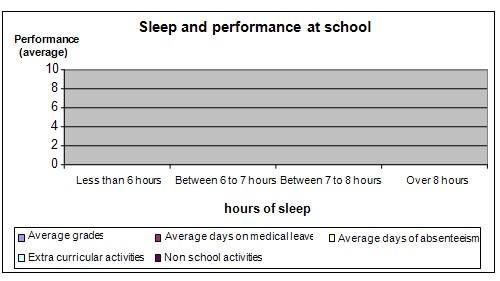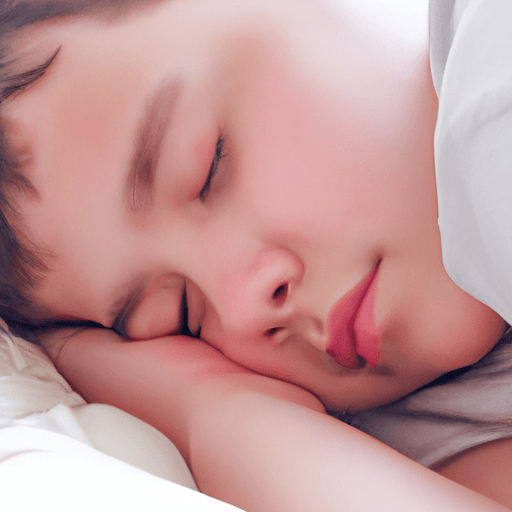| Complexity level: | 8 |
| Project cost ($): | 30 |
| Time required: | 1 day to prepare, 14 days for the science project experiment |
| Material availability: | Easily found |
| Safety concerns: | None |
Hypothesis
A ;Lack of sleep will have adverse effects on the performance of students.
Overview
Effect of sleep deprivation
Adults and children require between seven and eight hours of sleep every night. However most studies and surveys conducted on high school students show that they only sleep about 6.5 hours a day.
Sleep allows the body to recuperate and grow. Dead cells are replaced, damaged neurons are repaired and the brain gets the rest that it requires. The tired body gets refreshed and energized whilst we sleep.
Adolescents typically require even more sleep due to the psychological and physical changes that their minds and bodies experiencing during this phase of their lives. Being deprived of sleep during one's adolescent years leads to mental, physical and social problems amongst these children.
Children deprived of sleep are observed to have a poorer memory, reduced alertness and are slower to respond. They also get irritated easily, lack concentration, socialize less and are unable to handle complex duties.
A lack of sleep also reduces the white blood cells in the body, causing the body’s immunity to be weakened and vulnerable to infection. This in turn leads to many health related problems.
Scientific Terms
Materials
The materials required for this science project:
- 20 male and 20 female students 15 years of age
- consent forms
- A desktop or notebook computer, to help analyze your data
- Permission from the school administration
Procedure
1. For this science project, the independent variable is the amount of sleep that the students get every day. The dependent variable is the performance of the students in various categories – average grades, average sick leave, average absenteeism, extracurricular activityiesand out of school activities. This is determined by analyzing the data obtained from the students. The constants (control variables) are the selected age group, the timing of the survey (during the exam or before a sports tournaments) and the location of the school (urban or rural).
2. Permission is obtained from the school administration to perform this science project and to also gain access to some of the students’ confidential information.
3. Start by randomly picking two groups of 20 boys and 20 girls all aged 15 years. They are each given a form (table 1) to fill about their sleep pattern, health problems, school attendance, extracurricular activities and out of school activities for the next 2 weeks.
Table 1 – Table used to source student data
Name |
Age |
Average grade |
|||
Day |
Hours of sleep the night before |
Indicate if sick or on medical leave |
Indicate if absent from school |
Extracurricular activity (if any) |
Out of school activity (if any) |
Day 1 |
|||||
Day 2 |
|||||
| ..... | |||||
Day 14 |
4. After 2 weeks, the forms are collected and submitted to the school administration , in order to verify the students’ grades and attendance records.
5. The verified forms are collected from the school administration for analysis. The data on the students’ sleep patterns is categorized into the following groups :
a. less than 6 hours
b. between 6 to 7 hours
c. between 7 to 8 hours
d. over 8 hours
6. The average grade, sick leave, absenteeism, extra curricular and out of school calculated and their average scores calculated, according to the 4 groups above.

Results
Do your resultsshow that there is a correlation between the lack of sleep and the student's grades? You will probably discover that students who have less sleep tend to perform more poorly on average.
Table 2 – Average sleep and performance at school
|
Average grades |
Average days on medical leave |
Average days of absenteeism |
Extra curricular activities |
Non school activities |
|
|
Less than 6 hours |
|||||
|
Between 6 to 7 hours |
|||||
|
Between 7 to 8 hours |
|||||
|
Over 8 hours |
Use the graph below to plot the results of your analysis.

Conclusion
You should be able to ascertain from the data gathered that the hypothesis is true. The lack of sleep usually causes a student’s grades and health to decline.
Students need a lot of sleep, especially during their teenage years when the body is growing very quickly and undergoing many changes.
Also consider
The science project can be repeated by using a larger pool of students over a longer period of time to obtain better averages results.
Try to modify the project to compare the performance of students from urban schools and schools in rural areas.
References
The dramatic link between sleep and student performance –http://www.publicschoolreview.com/articles/83
Adolescent sleep needs and school performance - http://nysut.org/research/bulletins/981202adolescentsleep.html

